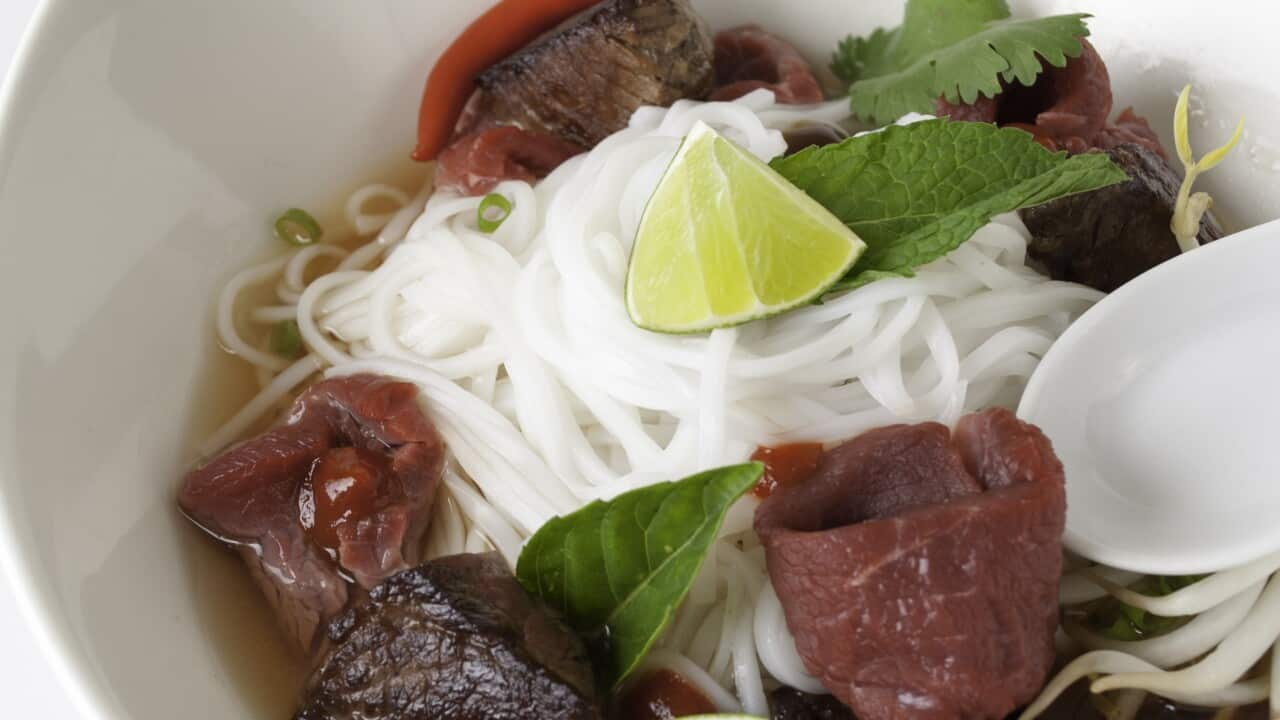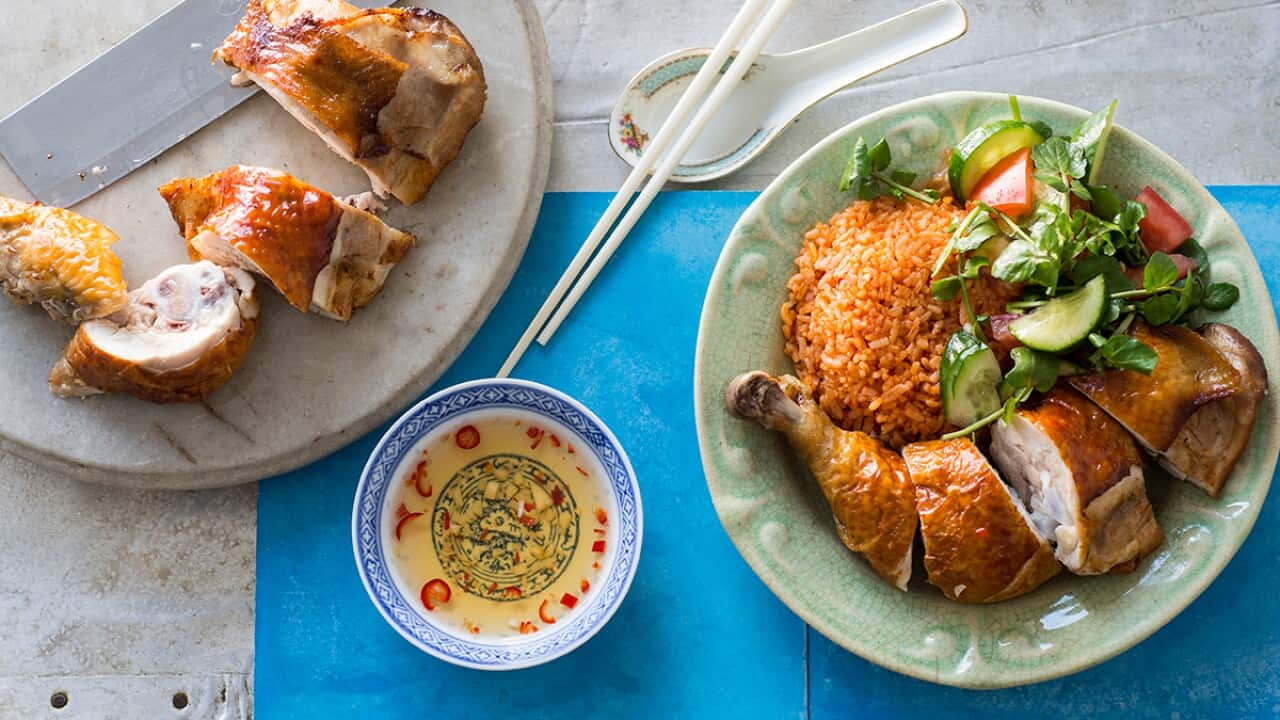I was born in the early 1980s in Hai Phong, a major port city in north-eastern Vietnam, where, because of the French colonial era, people enjoy food with both French and Chinese influences. For example, Vietnamese rolls.
My family home was located in the middle of the local fresh food markets, so my childhood was filled with street food – from to bánh trưng to rượu nếp cẩm, a bowl of fermented sweet dessert rice. The fresh market was a jungle for a five-year-old and it's where I started most of my daily morning adventures.
I used to wake up to the sound of the street hawker, singing out what fresh local produce was available for the day. Before heading out for work, my mum, Lan, would give us the equivalent of 50 cents, which 20 years ago was enough to get breakfast. School in 1980s Vietnam went from 7am until 5pm, with a lunch break in between. During lunch, we went home and prepped dinner from scratch because our parents often worked until late. Before I was eight, my four oldest sisters carried out that task, but after that, I began to chip in. One of my first cooking tasks was to kill one of our live chickens. My dad helped me the first time and then I could do it myself.
School in 1980s Vietnam went from 7am until 5pm, with a lunch break in between. During lunch, we went home and prepped dinner from scratch because our parents often worked until late. Before I was eight, my four oldest sisters carried out that task, but after that, I began to chip in. One of my first cooking tasks was to kill one of our live chickens. My dad helped me the first time and then I could do it myself.

Amy Nguyen with her mum in Vietnam. Source: Amy Nguyen
Sometimes our parents would treat us to a bicycle ride around the markets and my favourite night-time snack – a baguette with pate and chilli.
I saw how food united my family. It represented comfort and connection and brought peace.
My mum was a manager of a French restaurant, which meant she spoiled me with good food. My dad, Trong, would put me on the back of his motorbike to pick her up, and while waiting for her to finish, her colleagues offered me delicacies like snails and quails.
I learned most of my cooking skills by observing and assisting my mum to prepare food for religious family gatherings at our home. Twice a month, the extended family came over for dinner to honour our deceased ancestors. We'd read out their names and pray, before sitting down to enjoy an eight-course meal. Dishes included caramelised pork belly, stewed pork trotters with dried bamboo and . During these feasts, I saw how food united my family. It represented comfort and connection and brought peace. In Vietnam culture, it doesn't matter if you have a grudge with another family member, when it's time to pay respect to the ancestors you must be there.
A FAMILY FAVOURITE

Caramelised pork belly
I remember my mum's amazing noodle soup, , the most, although we couldn't always afford the ingredients. It was so special that we wouldn't leave the table until we'd sip the last drop of broth, usually made with beef bones or chicken, and roasted ginger, onions, star anise and other roasted herbs, which simmered over the stove for up to 10 hours.

A piping hot bowl of pho always goes down a treat. Source: Great Aunty Three
Escaping Vietnam for a better life
My dad didn't believe in the communist system in Vietnam, and after observing the fallout in the mid-70s, he wanted to give his children freedom. He began by sending my eldest sister, Qui, who is about 20 years older than me, by boat to Hong Kong. This was even before I was born. My parents tried at least 10 times to send her but failed. She was sent to prison after she was arrested by Vietnamese authorities.
Much of my parents' money during those years were spent trying to free her, which was why our food was simple back then.
When I was four, my second eldest sister, Anh, who was 17 at the time, reached a refugee camp in Hong Kong. From there she was sponsored by a Vietnamese family in Australia, and she migrated to Canberra.
Fortunately, thanks to the immigration policy under the Howard government in the 1990s, Australia and its people opened their arms to us, and our whole family reunited in Canberra when I was 12.
During those early years in Canberra, we cooked Vietnamese food to quell our homesickness. We kept honouring our ancestors through food, which was healing and comforting. We couldn't find all the ingredients needed to make Vietnamese dishes, so we modified them. Our usually salty dishes became sweeter. However, as Australia become more culturally diverse, we enjoyed our food as we did in Vietnam.
Mum was also home more in Australia, and she took ownership and pride in her new kitchen. She made eight-course feasts for lunch and dinner. Whenever I visit her with my two children, her famous phởis on her stove and my kids love it as much as I did as a child.
MUM'S STAR DISH

Vietnamese beef noodle soup (pho)
The beginning of Zen Tea Lounge Foundation
In my early 20s, I moved from Canberra to Sydney where I was a social worker. I also opened a small Vietnamese takeaway store in Chatswood in Sydney's north. Once I realised it didn't give me the satisfaction I envisaged, I closed it down and focused on my community work. Years later, I created an online tea store as a side hustle and named it Zen Tea Online. It was during that time that one of the ladies who worked with me told me she was experiencing domestic violence. I realised that I couldn't help her through my online tea business, but I could if I opened a cafe. This is because a cafe allows people who are experiencing domestic violence to learn hospitality skills, which helps to give them financial independence. This can help them break free from their situation.
Private investors who shared my vision supported me to open in Smithfield in western Sydney in 2016 – first as a social enterprise and then as a foundation since our direction is to support the greater community. I recognise the power that food has to connect people through my own family experiences. Food is a symbol of happiness and union, and represents culture and traditions. Sharing food is a way to connect with the world and signify our existence, and that's what it does here too. We notice how the women who come to Zen often overfeed the employees who work there; it's their way of showing respect and appreciation.
I recognise the power that food has to connect people through my own family experiences. Food is a symbol of happiness and union, and represents culture and traditions. Sharing food is a way to connect with the world and signify our existence, and that's what it does here too. We notice how the women who come to Zen often overfeed the employees who work there; it's their way of showing respect and appreciation.

Amy Nguyen's initiative continues to grow. Source: Amy Nguyen
Food is a symbol of happiness and union and represents culture and traditions.
Up until the pandemic, we trained six women affected by domestic violence every six months. They mostly find us through referral agencies, like Centrelink. However, now we can only train three women every six months due to a lack of funding and volunteers/employees. The women graduate with a Certificate IV in Commercial Cookery, and they receive our cookbook, which can help them move into full-time employment or to open their own cafe.
At Zen, we offer Asian high tea with cultural experiences such as cooking classes, tea ceremonies or calligraphy. Our menu is a fusion of Asian dishes, including those from Singapore, Malaysia, China, Cambodia, Thailand and Vietnam.
Our chef's special is and crispy chicken with red rice. All of our dishes are all family recipes that our participants have shared, developed and modified through the course. When their own cultural dish is added to our menu and ordered by our customers, they receive a partial cash incentive while the rest goes back into the foundation to fund other self-development programmes.
ZEN LOUNGE DISH

Crispy skin chicken with red rice (com ga chien don)
Simply put, Zen Tea Lounge is essentially a place in which the women feel safe and connected. About an hour before work begins, they do a 'tea meditation', which gives them time on their own and to focus. During the day, we also practice mindfulness through preparing, cooking and tasting food, the way we talk to each other and the way we serve our customers.
What we've found about Zen Tea Lounge is that our customers address our participants by their names. After their meals, they take their empty plates from the outdoor garden into the kitchen and some even bow. This simple act of kindness is truly powerful, and it not only validates our participants' self-esteem and restores their integrity, but it also gives them a sense of community connection, self-confidence and belonging, and mostly it cultivates gratitude. Our participants know that every dollar they make at Zen Tea Lounge not only goes to support them and their family, but to empower others through our emotional intelligence, relationship-building or self-defence workshops across Sydney.
Unfortunately, we lost many of our employees during the pandemic, while the demand for our domestic violence services increased. We're hoping to secure funding that allows us to employ an administration team, so we can continue to get our work done.
It takes a village to raise a child and it also takes a whole community to support a woman. We are truly amazed and grateful for the Zen community.
If you or someone you know is experiencing family violence or sexual assault phone 1800RESPECT/1800 737 732 or visit .






